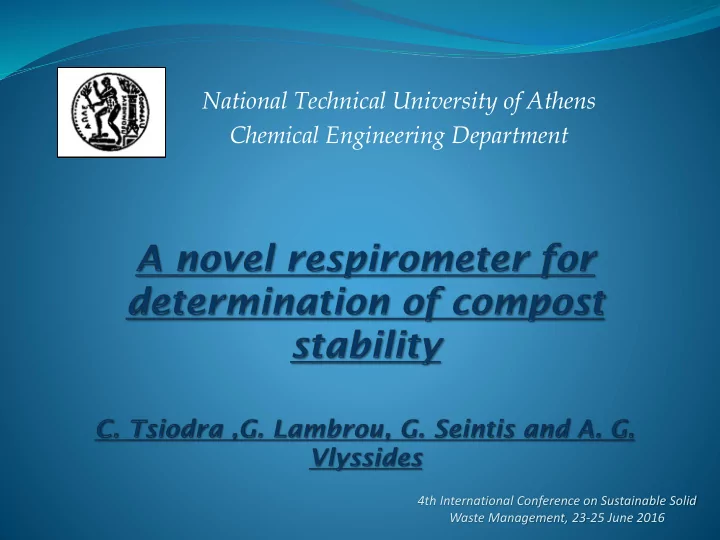

National Technical University of Athens Chemical Engineering Department 4th International Conference on Sustainable Solid Waste Management, 23-25 June 2016
Aim of this work A novel respirometric technique for composting process determination through Estimation of the maximum Oxygen Uptake Rate (or maximum CO 2 evolution ) The biological kinetic rate k (day-1) of O 2 uptake The time required to complete the autotrophic and heterotrophic bio reactions The current process has been tested on olive mill wastes. 4th International Conference on Sustainable Solid Waste Management, 23-25 June 2016
World wide Olive oil Production 4th International Conference on Sustainable Solid Waste Management, 23-25 June 2016
European Olive oil Production 4th International Conference on Sustainable Solid Waste Management, 23-25 June 2016
Composting Integrated water treatment technology of mill waste (solid and liquid) Composting can be classified as an aerobic process that includes a series of chain reactions which have as main denominator, the oxygen consumption rate. Fertilizer or otherwise compost - product with added value The direct deposition to the ground gives: increased water holding capacity enhancing cation exchange increased antimicrobial action. 4th International Conference on Sustainable Solid Waste Management, 23-25 June 2016
Phase of Composting Biodegradable organic carbon or stabilization phase dominating actinomycetes that deconstruct organic compounds increasing the temperature above 50 o C Maturing phase: eukaryotic microorganisms take place in order to control the bio reactions and nitrification reactions are completed Humification phase organic products of previous phases transformed into fulvic and humic compounds giving the final product the properties of water holding capacity, the ion exchange and biological activity. 4th International Conference on Sustainable Solid Waste Management, 23-25 June 2016
Compost Stability and Maturity Maturity is often assessed through sensory activity or the potential for plant growth. Maturity is best assessed with plant growth and a combination of several other assays. Stability can be determined by the rates of O 2 uptake, CO 2 produced or the heat released as a result of microbial activity. The chemical and physical stability of the compost determines the shelf-life and applicability of compost for various uses The biological stability suggests the extent to which biodegradable organic matter has decomposed. The key point of this knowledge is the degree of biological stability of a compost due to fact that it is recognized because it affects the potential for odor generation, biomass re-heating, residual bio gas production, re-growth of pathogens, GI, plant disease suppression ability and process parameters such as airflow rate and retention time 4th International Conference on Sustainable Solid Waste Management, 23-25 June 2016
Oxygen Consumption rate The organic substrate stabilization achieved with low moisture content up to 50%. Although there are many direct process control parameters for adequate monitoring of compost such as temperature, pH and moisture More information considering the biological activity of the composting process can be obtained by monitoring the oxygen uptake rate (OUR) of the organic matter Oxygen Uptake Rate (OUR) of the organic matter is assessed indirectly by measuring the CO 2 that is produced from the biological respiration of the organic material. 4th International Conference on Sustainable Solid Waste Management, 23-25 June 2016
Respirometric technique Organic materials from different composting phases were tested for their respirometric abilities. CO 2 evolution rates were measured during each cycle and obtained results were evaluated considering the composting progress. Usually maximum levels of OURs are reached approximately at 12-48 hours, depending on the temperature. 4th International Conference on Sustainable Solid Waste Management, 23-25 June 2016
Respirometer Device v BR = Bioreactor Digestion HE HA ΡΡ = Peristaltic Pump ΗΕ = Water Conseder CO IC 2 ΗΑ = Moisture Removal GA BR GA = Gas Analyzer V = Venting Gas Line PP Η V = Temperature Control Area HV 4th International Conference on Sustainable Solid Waste Management, 23-25 June 2016
The indicative parameters at the stage of humification 4th International Conference on Sustainable Solid Waste Management, 23-25 June 2016
Rate of Oxygen Consumption (mgO2/kg. d. c/d) 4th International Conference on Sustainable Solid Waste Management, 23-25 June 2016
Results 4th International Conference on Sustainable Solid Waste Management, 23-25 June 2016
Total maximum oxygen consumption rate 4th International Conference on Sustainable Solid Waste Management, 23-25 June 2016
Oxygen correlations The characteristic oxygen absorption curves which were obtained are correlated with other parameters such as WCH, pH, HA and CEC. It is observed that there is a good correlation between the measured oxygen consumption in order to be used for the prediction of the compost evolution of any substrate. As the composting time is being the maximum oxygen uptake rate and the stabilization time are reduced. 4th International Conference on Sustainable Solid Waste Management, 23-25 June 2016
Oxygen Consumption and HA Oxygen existent in structural component of the nucleus. High concentration of humic compounds in a product can justify the high pH as well as the dark to black in color 4th International Conference on Sustainable Solid Waste Management, 23-25 June 2016
Correlation between oxygen consumption and other parameters 4th International Conference on Sustainable Solid Waste Management, 23-25 June 2016
Correlation between oxygen consumption and other parameters 4th International Conference on Sustainable Solid Waste Management, 23-25 June 2016
Conclusion Under an effort to measure the most significant biological parameter development factors based the whole process, a device created, giving the ability to measure the maximum The maximum rate of oxygen oxygen adsorption rate in 2 days. consumption enables prediction Oxygen could be directly connected and monitoring of composting with all the other parameters evolution. This is so important due to fact that there is the ability Strong correlation between oxygen consumption HA,CEC, WHC and pH to save time in analyzing the presented samples in industrial application. Though that correlations, is given the chance for a rough estimation of the parameters of a sample. 4th International Conference on Sustainable Solid Waste Management, 23-25 June 2016
Thank you very much for your attention Questions???? HAPPY SUMMER 4th International Conference on Sustainable Solid Waste Management, 23-25 June 2016
Recommend
More recommend